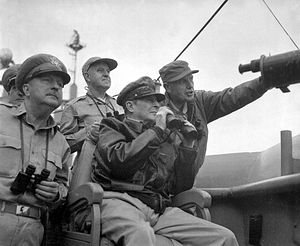Newly available testimony from the Korean War has shed some light on why the war remained limited, and on how the Americans viewed the extent of their commitment to the peninsula. Testimony in the investigation of the firing of General Douglas MacArthur indicate how the Joint Chiefs of Staff understood the military situation in early 1951, as MacArthur called for the U.S. Air Force to escalate the conflict by bombing China directly.
Key elements of the testimony were redacted until the 1970s, in order to protect U.S. methods of intelligence collection. Although available after that point, the key reports were not widely known until recently. The testimony indicates that senior members of the U.S. military obsessed over the potential for Communist escalation, both on the part of the Chinese and of the Russians. The Chinese, for example, made no concerted effort to use airpower to challenge U.S. logistics, even for a short period of time.
The Soviets remained mostly on the sidelines, carefully calibrating their own participation to avoid giving the U.S. cause to escalate. But the Soviets had sufficient troops available to give the Communists a massive advantage if they chose to commit their forces. Moreover, General Omar Bradly, Chairman of the Joint Chiefs, feared the commitment of the Soviet Pacific Fleet submarine force to the war, believing that the subs could threaten UN logistics on the Peninsula.
We can quibble with some of the estimates made in the testimony, which may have suggested greater strength than either the Soviets or the Chinese could have brought to bear. The Joint Chiefs may also have held their collective thumbs on the scale in order to avoid a bigger crisis of civil-military relations, as MacArthur and his allies sought to create a conflict between Congress and the Truman administration.
Still, the testimony reflects a refreshingly sophisticated understanding of how states evaluate their commitments during war. Undoubtedly with an appreciation of industrial scale conflict that emerged from the cauldron of the Second World War, the Chiefs understood that states commit military power only with great care, and that they have multiple demands upon their resources.
Armchair critics of foreign policy commonly assume that the enemy operates with no restraint; that foes have determined to exercise maximum effort. This critique seeks to undermine efforts at unilateral constraint by depicting them as foolish and naïve. Why should we restrain ourselves when the Russians, or the Chinese, or the North Vietnamese, or the Palestinians, or the Americans do not? Without a sense of how the other side thinks, this kind of critique resonates with a public certain that we could win if only we didn’t fight “with one hand tied behind our back.” But in fact, the commitment of all-out effort is more the exception than the norm; conflicts fought for limited objectives usually stay limited, at least when wiser heads prevail.

































